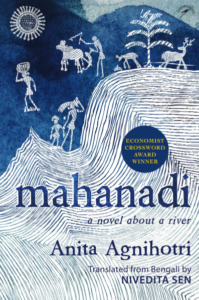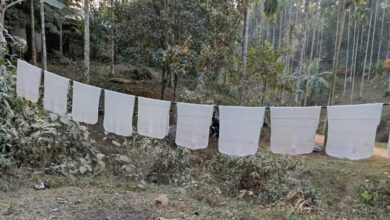
BOOK REVIEW
 Anita Agnihotri’s writings have always been tempered by her socially conscious voice as she delves into the struggles in the lives of the marginalised communities of India. Whether it is Mahuldihar Din (translated in English as Mahuldiha Days) or Kaste (translated in English as The Sickle), Agnihotri has always sought to give voice to the travails of the marginalised and oppressed communities who eke out an existence on the fringes of society.
Anita Agnihotri’s writings have always been tempered by her socially conscious voice as she delves into the struggles in the lives of the marginalised communities of India. Whether it is Mahuldihar Din (translated in English as Mahuldiha Days) or Kaste (translated in English as The Sickle), Agnihotri has always sought to give voice to the travails of the marginalised and oppressed communities who eke out an existence on the fringes of society.
In Mahanadi, the author has deviated from the usual structure of a novel. She has woven her novel around the voluminous river Mahanadi that originates from the foothills of the Sihaoa mountain of Chhattisgarh and flows for a thousand kilometres through Chhattisgarh and Odisha, finally immersing in the Bay of Bengal at Jagatsinghpur near Paradip.
As the ‘Translator’s Note’ for readers explains, “The chapters of Mahanadi have different names, so I initially read them as individual stories. Despite being self-contained, they do not follow linear trajectories in the lives of the characters therein. Their summer and winter, agonies and ecstasies, devastation and rebuilding are all subsumed within the grand narrative of the eponymous river that documents their intertwining lives within an intricately friendly and hostile interplay with nature.
“Mahanadi, not an inert, geographical signpost but ‘an unattached, beautiful enchantress’ (…) in a boatman’s household, therefore, is the protagonist all along. Involved as we might get with the so-called ‘characters’ in the novel, we have to leave them behind and move on with the river. New characters like Tanmay, Asavari and Shambhu Mahakud take up the reins from Banasri, Ashu and Haradhan Bhoi midway through chapters to reshape the storyline, while Upamanyu Patra, Simanta and Parvati reappear in subsequent chapters to sustain a thread of continuity in a consciously open-ended novel with virtually no plot.”
Agnihotri, who writes in Bengali, has chosen as her subject the people and the culture of the regions of Chhattisgarh and Odisha where the Mahanadi flows, depicting the lives of the people living near the riverbank through the chronicle of the river. We are introduced to the farmers, artisans and weavers who have come to settle near the river. The story of their lives is intertwined with the local history and myths of the land. The beauty of the hills, the forests and the river are juxtaposed against human sufferings, joys and festivities. The English translation of Mahanadi by Nivedita Sen will ensure that people across India as well as around the world can now read this monumental work that was previously restricted to a Bengali readership.
A work of profound and lasting importance, this is also a scathing social commentary on poverty, greed and corruption. We can feel the horrors inflicted by a dam echoing for decades. We are shown how an ancient way of life by the banks of a mighty river is threatened by the hazards of poorly planned industrialisation.
This unusual chronicle of one of the largest rivers of India shines insightful light on some of the least developed, poverty-stricken regions of Chhattisgarh and Odisha whose inhabitants struggle to make ends meet living on the banks of the mighty Mahanadi. Living on the margins of mainstream society, these people and their way of life have mostly remained unknown to the rest of India. A socially conscious writer, Agnihotri sensitively evokes profound empathy in her powerful portrayal of these communities that have been consistently sidelined and excluded, the river forming the crux of the narrative. This is a socially relevant novel that resonates with the reader long after the chronicle has finished.
~ Contributed by Papia Dey
Book: Mahanadi: The Tale of a River; Author: Anita Agnihotri; Translator: Nivedita Sen; Publisher: Niyogi Books; Pages: 485; Price: Rs 595





